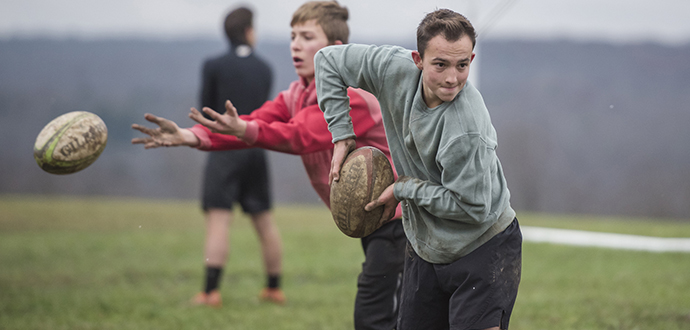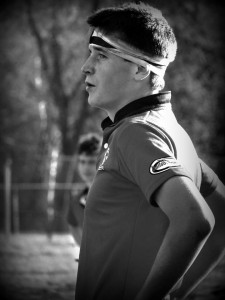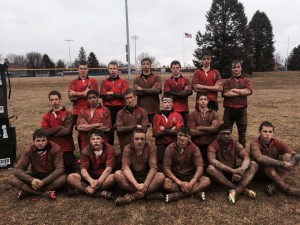
It is no secret that adolescence is a trying time. The word adolescence itself is derived from a word meaning “to burn.” But, as fire can be a destroyer it is also a nurturer, a source of culture. The masculine adolescent propensity is one that seeks physical experiences and their emotional corollaries. Adolescent passions are bent on encounters that experiment with the dangerous and the amorous. Such passions are not unnatural, and therefore they are not to be discouraged—only guided. Too much restriction results in deformities that cripple a person for life, which is itself a risky and emotional enterprise. Adolescence must be permitted, though it involves the taking of risks. The risks can be calculated. The falls, few. But risks they must have, and falls as well if young men are to learn and grow. Adolescence (especially male adolescence) must be allowed to run its normal, healthy courses in the process of human development, which includes not only the body, but the soul as well. A mature Faith cannot exist in a body, mind, and soul that have been inhibited from their due maturation by excessive caution.
Adolescence can be a time where passions are misspent, given to rage, to the ruin of character; or a time where passions are controlled, given necessary vent, and temper character. The teenage years often manifest an inherent urge for trials to discover the limitations of individual abilities in a rebellious nature, where the limits of circumstances are pushed, which is a misplacement of a young man’s natural tendency to discover his strengths and his weaknesses. Such necessary examinations and discoveries should result from an appropriate venue. This important discernment of self can be achieved with marvelous success through gymnastic involvement, where a young man is able to embrace challenges, assume risks, and gain a real and raw knowledge of himself based on his own accomplishments and failures alike.
The daily training in the athletic programs at Gregory the Great carries a two-fold purpose. Firstly, boys require exercise for healthy development both physically and mentally. Secondly, methodical sporting endeavors demonstrate the importance of proper training and discipline, both on the practice pitch and in the games. When these requisites are, or are not, done well the effects eventually become evident to the players and they are able to see clearly the consequences of their actions. In this world of immediate gratification obsessed with convenience and instantaneous acquisition of whatever is desired, the role of physical competition is a true awakening. In sports, good results are the outcome of long, hard toil, dedicated effort, strict discipline, and responsibility. It is no mean lesson. All ends that are worth achieving in this life entail such drawn out processes, requiring both patience and practice.
 Competing at a high athletic level demands that the contestants invest themselves to a certain degree and take the necessary risks to become proficient and confident. Also, given the academic focus of Gregory the Great Academy, athletics cultivate and balance intellectual efforts by supplying a critical outlet for young men to exercise their bodies, while testing and determining their individual physical capacities. The teaching and coaching staffs take these truths a step further by pedagogically pointing out to their athletes that sports can and should be viewed as a microcosm of life. As such, they can at least disclose to an individual his own stamina to succeed and level of devotion to a cause.
Competing at a high athletic level demands that the contestants invest themselves to a certain degree and take the necessary risks to become proficient and confident. Also, given the academic focus of Gregory the Great Academy, athletics cultivate and balance intellectual efforts by supplying a critical outlet for young men to exercise their bodies, while testing and determining their individual physical capacities. The teaching and coaching staffs take these truths a step further by pedagogically pointing out to their athletes that sports can and should be viewed as a microcosm of life. As such, they can at least disclose to an individual his own stamina to succeed and level of devotion to a cause.
Rugby in particular is an essential component in the formation at Gregory the Great Academy. The very nature of the game drives boys to become men. Elevation of heart and soul are intrinsic to the language and art of rugby. The game was created for the very purpose of teaching leadership and virtue to young men. While violence mixed with malice is the worst of crimes, the ability to push one’s body, sustain injury, and hit hard for the sake of a good end is a vigorous participation in reality. It is a game of glory, leadership, sacrifice, suffering, and joy which rises in a Catholic environment to heights beyond which its founders ever conceived.
It is in the participation of this sport that boys can discover themselves most deeply and accurately. Rugby compels boys to control and overcome their fear, not to evade it. The elements and nuances of the game give the students a truly unique opportunity to live out many of the heroic and moral standards they learn in the classroom. It is on the rugby pitch the boys can apply themselves to the challenge of meeting these standards in a very real situation where their actions can be judged, by themselves and others, as honorable, brave, or otherwise. In addition, the intellectual aspect of the game develops cognitive agility and strengthens the ability to make decisions with confidence.
Since rugby is a very difficult sport to master, it requires a high level of resolve; but, with continued perseverance, the boys learn what perseverance actually is and the value of this moral virtue – one necessary for men to possess in the world and critical for the realization of our noble calling as sons of God and heirs of heaven.
 It is the duty of a boys’ school to understand the nature and disposition of boys, which is to understand their psychology, physiology, and temperaments. At Gregory the Great Academy, competitive sport is a crucial source of educational development and formation in these vital areas. The body must be cared for as well as the soul and mind. Playing sports leads a boy to a true self-awareness and can teach him such important virtues as perseverance, courage, self-mastery, and magnanimity. Athletics also give boys very tangible lessons about human nature and how to react to adversity. Winning or losing a hard match properly and in the right spirit teaches young men much about what it is to be a man.
It is the duty of a boys’ school to understand the nature and disposition of boys, which is to understand their psychology, physiology, and temperaments. At Gregory the Great Academy, competitive sport is a crucial source of educational development and formation in these vital areas. The body must be cared for as well as the soul and mind. Playing sports leads a boy to a true self-awareness and can teach him such important virtues as perseverance, courage, self-mastery, and magnanimity. Athletics also give boys very tangible lessons about human nature and how to react to adversity. Winning or losing a hard match properly and in the right spirit teaches young men much about what it is to be a man.